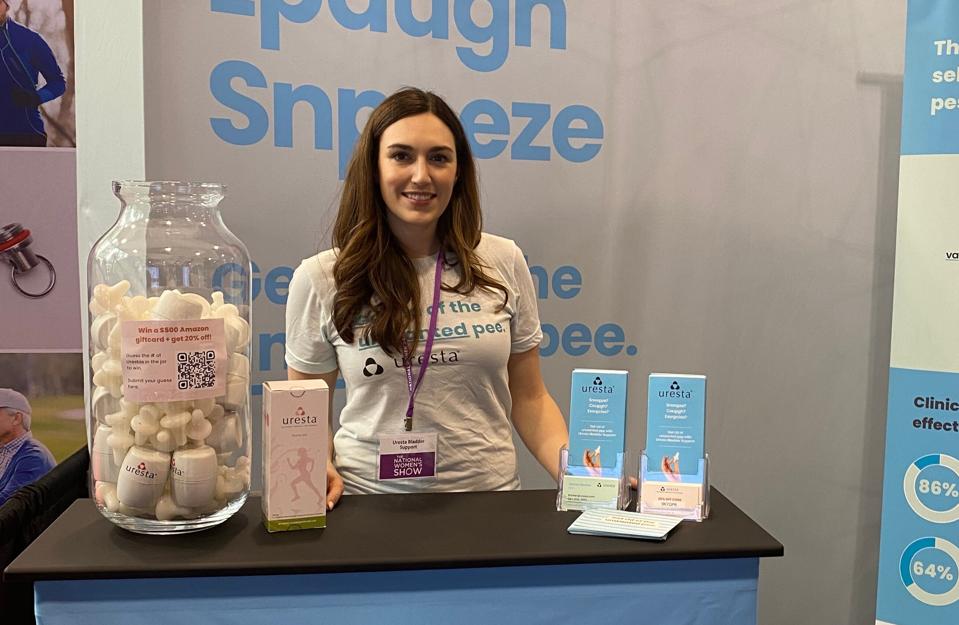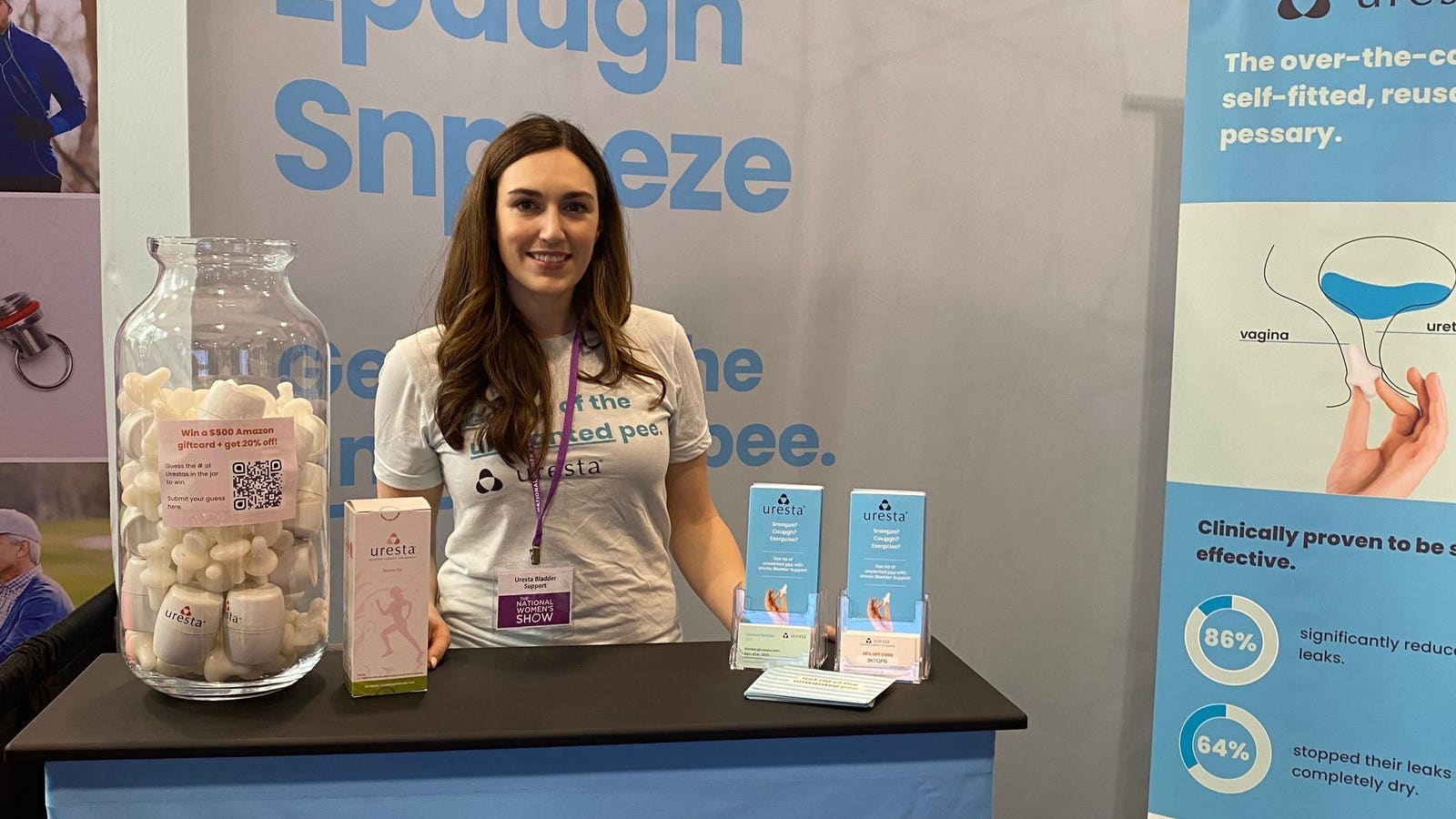
Lauren Barker, CEO and cofounder of Uresta, at a trade show
Courtesy of Uresta
As more women share their health stories, we find that our unique experiences aren’t so unique. One common conversation between women, especially those who gave natural birth or are in the depths of menopause, centers around bladder leaks. A frequent suggestion by doctors is to use pads or adult diapers; basically, whispered embarrassment was prescribed in place of answers.
Women are no longer accepting the bare minimum. We are tired of our voices being dismissed in the doctor’s office. Women’s health problems are too often minimized, misdiagnosed or outright dismissed, until someone decides to build something better.
“The solutions today aren’t doing anything to improve women’s quality of life,” Lauren Barker, CEO of Uresta, shares during a phone interview. “[Bladder incontinence]
is a chronic issue, impacting women every single day and unfortunately, impacting them in ways that are impacting their ability to be physically active, which is obviously important for health, but also mental health.”
Barker joined Dr. Scott A. Farrell to bring urinary comfort to thousands of women. They recently secured $3 million in funding to support its U.S. expansion and increase awareness of its bladder leak solution. BDC Capital led the funding round with a $1.5 million investment.
The company enhanced a traditional pessary, which is a prescribed medical device, typically made of silicone or rubber, that is inserted into the vagina to support areas affected by stress urinary incontinence. These devices have been used for decades as a non-surgical option for women with weakened pelvic floor muscles. Uresta offers a modern, self-directed solution that prioritizes women’s quality of life with its discreet design that’s optimized for comfort even during exercise.
Barker’s journey from investment banking to healthcare innovation began with a jarring realization: “I was blown away by how common bladder leakage was. One in three women after the age of 30 experience it, and then one in two by the time of menopause, and then 50% of women when they exercise. It’s a really big exercise issue.”
Her experience echoed a pattern seen across women’s health, where concerns are brushed aside as “just part of being a woman.” Instead of settling for a status quo built on managing symptoms, Barker and her team at Uresta focused on eliminating the problem itself. In less than a year on the U.S. market, Uresta has more than 30,000 users and a 97% immediate improvement rate.
Medical Gaslighting—The Silent Epidemic
Systemic dismissal of women’s symptoms—medical gaslighting—is neither rare nor subtle. The healthcare system’s response has historically centered on containment, not cure, creating a $16.5 billion market in symptom management.
This cycle isn’t limited to bladder health. From endometriosis to heart attacks, studies show women’s complaints are taken less seriously than men’s, leading to missed diagnoses, untreated pain and generations taught to accept limitation instead of demanding innovation.
Building Uresta
Barker didn’t set out to become a healthcare entrepreneur. Her entry was almost accidental. A connection made through a male colleague because, as she noted, “I was the only woman he knew in finance.” But what started as a favor quickly became a calling. Barker’s financial acumen, coupled with a willingness to listen, unlocked a conversation that most in medicine had ignored. “No pun intended,” she smiled, “but the floodgates started opening, and people would be like, ‘OMG, let me tell you this story about this time I experienced bladder leaks.’”
She spent two years helping Uresta’s inventor raise money and validate the need. It was only after having conversations with women in her life and hearing how many had given up running or endured embarrassment at work that she decided to step into a leadership position at the startup. “If I don’t partner with you,” she said to Dr. Farrell, “I’ll regret it if I don’t, at least, give it a shot.”
Lauren Barker, CEO and cofounder of Uresta, helped build a $3 million women’s health company.
Courtesy of Uresta
The Power Of Community And Speaking Up
With her background in investment, she understands the systemic bias and investment gaps that plague women’s health innovation, noting, “There’s not enough women on the investing side. I think that’s a big part of it, personally, and I have raised money for Uresta. I’ve had the opportunity to be on both sides of the table. It’s amazing to me the number of men I’ve met with who are like, ‘I don’t really see it, or I don’t really see it as a big issue.’ First of all, there’s medical statistics to back up how prevalent it is.”
The lack of women in venture capital keeps many women’s health issues underfunded and overlooked. Uresta’s success hinged on community over shame. Rather than relying solely on a product launch, Barker built momentum by having women openly share their stories and support one another.
She emphasizes the need for self-advocacy in healthcare settings. “I think advocating for themselves, especially in a medical setting, is tough. Physicians are really busy, so sometimes those quality of life issues get deprioritized. But I think it’s important to bring it up,” Barker stressed. Speaking up, in the doctor’s office and beyond, shifts the conversation and creates demand for better solutions.
When women stop accepting dismissal, innovation follows.
“I’m not blaming physicians,” Barker concludes. “I just think that they’re really strained. They’re trying to cover so many things during your visit. However, it’s important to note that if you’re having issues that may not seem life-threatening, but annoying, you should bring it up. You don’t have to suffer.”
MORE FROM FORBESForbesAI Agent Bosses Are Here—And They’re Redefining How We Lead. Here’s What To DoBy Cheryl RobinsonForbesWhy Walmart Invested $1 Billion In Internal Upskilling With Its AcademyBy Cheryl RobinsonForbesVibeathons Are Taking Over Hackathons To Rapidly Increase InnovationBy Cheryl Robinson

